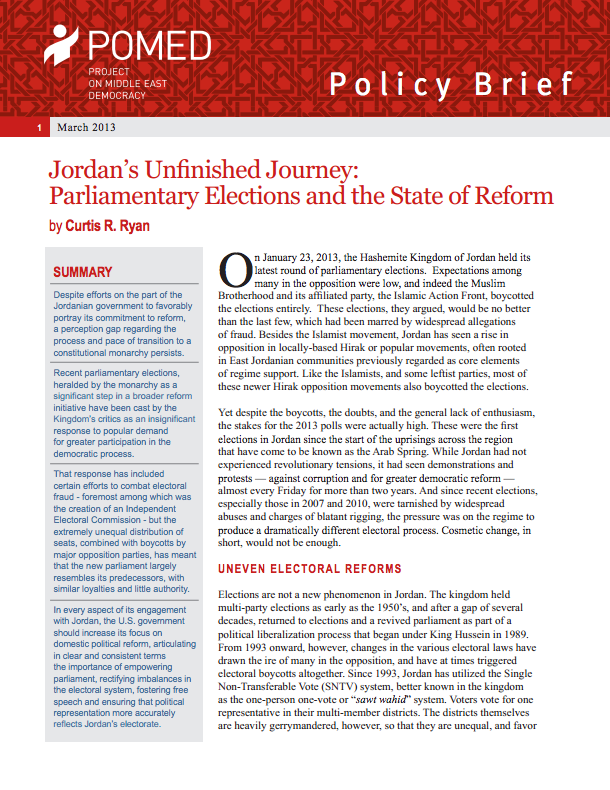For a full text copy of the brief, click here.

On January 23, 2013, the Hashemite Kingdom of Jordan held its latest round of parliamentary elections. Expectations among many in the opposition were low, and indeed the Muslim Brotherhood and its affiliated party, the Islamic Action Front, boycotted the elections entirely. These elections, they argued, would be no better than the last few, which had been marred by widespread allegations of fraud. Besides the Islamist movement, Jordan has seen a rise in opposition in locally-based Hirak or popular movements, often rooted in East Jordanian communities previously regarded as core elements of regime support. Like the Islamists, and some leftist parties, most of these newer Hirak opposition movements also boycotted the elections.
POLICY RECOMMENDATIONS
- Support making the IEC permanent and more independent.
- Support greater democratization and change within the electoral system. While the IEC helped improve the electoral process, the electoral system itself remains highly problematic and does not fully represent Jordanians.
- Support a stronger role for parliament. While the electoral system and the voting process are both important, ultimately they can be rendered irrelevant if parliament itself remains a weak institution.
- Support press freedom—including online media and an open internet. Jordan has been the leader in the Arab world in terms of development of the internet and information technology (IT). In 2012, however, vague press and publication restrictions were extended for the first time to online media.
- Engage Jordanian society—from civil society to political opposition. Broadly, Jordanians tend to believe that U.S. aid supports the regime, the Jordanian armed forces, peace efforts relative to Israel, and Syrian refugees. Many doubt, however, whether the United States is really concerned with domestic reform and change in the kingdom.
- Further support the rights and roles of women. Women enjoy full legal rights in Jordan, including voting rights and the right to run for office. In practice, however, many patriarchal tendencies remain.
- Support and commend Jordan’s guarantees of minority representation.
- Support the roles of Jordanian youth in political life. If much of the Jordanian reform effort depends on “empowering” and “engaging” various institutions, political forces, or social groups, one of the most important of these is Jordan’s highly educated, but increasingly constrained, youth population.




|
Advancing Democracy Overseas – Not Isolationism – Protects American Interests, writes Tess McEnery and Patrick Quirk in the National Interest